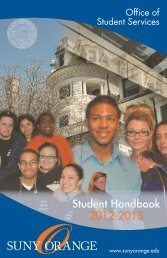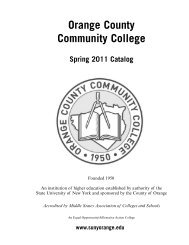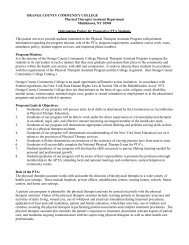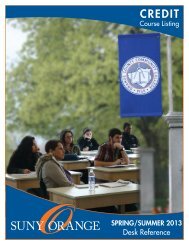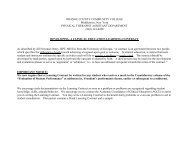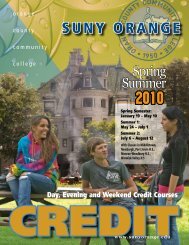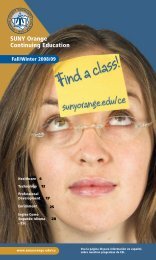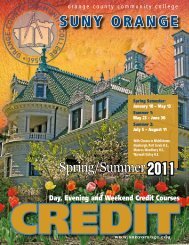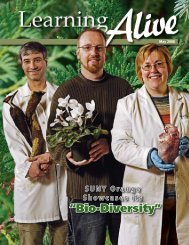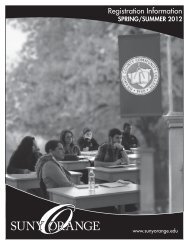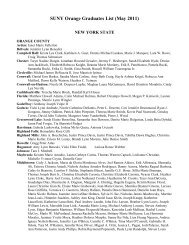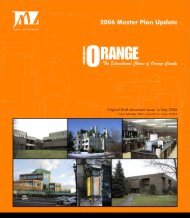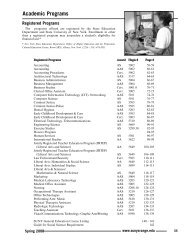You also want an ePaper? Increase the reach of your titles
YUMPU automatically turns print PDFs into web optimized ePapers that Google loves.
Accounting - Anthropology<br />
ACC 211—Federal Income Tax Procedures<br />
3 cr. (Fall-late day)<br />
Course emphasis is placed on the current status of<br />
Federal income Taxes as they relate to individuals The<br />
history of Federal Income taxation as well as the<br />
Federal taxation of business income is also covered.<br />
After completion of the course, the student will be<br />
able to prepare an individual Federal Income Tax<br />
return. The course materials include valuable<br />
reference tools.<br />
Prerequisites: ACC 101<br />
ACC 214—Accounting Practice<br />
4 cr. (Spring-Late Day)<br />
Topics include software issues related to new<br />
company configuration, security controls, and<br />
troubleshooting. Accounting applications are in the<br />
areas of bank reconciliation, payroll programming<br />
and reporting, sales and excise tax reporting, and<br />
management of payables, receivables, and cash.<br />
Emphasis is placed on the skills and attitudes needed<br />
to assume a “full-charge” office bookkeeping<br />
position. QuickBooks Accounting software will be<br />
used in this course.<br />
Prerequisites: ACC 102 and BUS 161 or ACC 153<br />
and BUS 161<br />
ACC 220—Accounting Internship<br />
3 cr. (Spring)<br />
Students enrolled in this course will intern at<br />
organizations appropriate to learning about<br />
accounting and accounting-related fields. Students<br />
will integrate classroom theory in a monitored and<br />
supervised work experience. Periodic meetings with a<br />
faculty advisor and written assignments are required.<br />
Evaluations by workplace supervisors are also<br />
required. The student intern is required to work a<br />
minimum of 90 hours during the semester.<br />
Prerequisites: Permission of instructor or ACC 102<br />
or ACC 153; ACC 214, ACC 205; and BUS 203. A<br />
minimum CumGPA of 2.5 is also required.<br />
Anthropology<br />
(Behavioral Sciences Department)<br />
ANT 101—Cultural and Social Anthropology<br />
3 cr. (Fall/Spring)<br />
A cross-cultural approach to the nature of culture<br />
as humanity’s means of existence, focusing on such<br />
topics as the method of scientific research in cultural<br />
anthropology, the basis of language, a comparative<br />
study of events of the human life cycle, family and<br />
kinship, religion and ritual, and theories of social<br />
change and development. Fulfills category C. (GE 3)<br />
ANT 102—Human Evolution<br />
3 cr. (Fall)<br />
This course applies Darwinian evolutionary theory<br />
to an examination of the position of the human<br />
species within the animal kingdom, the characteristics<br />
of primates, the evolutionary origins of human<br />
behavioral patterns, the fossil record of human<br />
evolution, the study of race, and continuing human<br />
evolution. Fulfills category C. (GE 3)<br />
ANT 103—Archaeology and Prehistory<br />
3 cr. (Spring)<br />
This course investigates the contribution made by<br />
archaeological science to an understanding of the<br />
process by which human society evolved from earliest<br />
forms to the emergence of complex civilizations in<br />
various parts of the world prior to historical times.<br />
Fulfills category C. (GE 3)<br />
ANT 104— Archaeological Field Experience<br />
1 lect., 6 lab., 3 cr.<br />
This course is designed to provide students with<br />
experience conducting archaeological research.<br />
Students will participate in all aspects of the field<br />
process including laying out a grid, excavating test<br />
pits, mapping, photographing, documenting the<br />
archaeological record and recovering artifacts and<br />
features. Instructor led lecture and discussion will<br />
begin each field day so that students are able to<br />
understand the larger context of the work they are<br />
doing. In addition, select field trips and guest<br />
speakers will provide additional context for the<br />
specific site to be investigated. Length of time in the<br />
field will be a minimum of 90 hours over four weeks.<br />
ANT 220—Indians of North America<br />
3cr. (Spring)<br />
This course is an analysis of Native American<br />
cultures north of Mexico from early times to the<br />
modern era. Ecological, historic and ethnographic<br />
data are utilized to review the various cultural areas.<br />
The southwest, plains, northwest, southeast and<br />
northeast cultures<br />
168 www.sunyorange.edu Spring 2012



